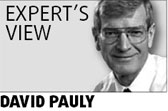Try and try again as Fed seeks to calm the market
If this doesn't end the market panic, what will?
In a rush of desperate moves - or creative actions, depending on the point of view - the Federal Reserve since last Friday has shown a determination to prevent the US banking system from descending into chaos and dragging the nation's economy with it.

The Fed engineered the takeover of Bear Stearns Cos, an 85-year-old investment firm that was experiencing a run by its lenders and customers.
What's more, the central bank said it would lend money - without any designated limit - to the 20 investment firms that deal in US Treasury securities.
The Fed also lowered the interest rate on which it lends to commercial banks, the so-called discount rate, by a quarter-point to 3.25 percent.
It goes without saying that at its regular policy meeting today the Fed will cut its rate on overnight loans between banks from 3 percent in a continuing effort to reduce borrowing costs throughout the economy.
What more do investors need to bolster their confidence?
While this looks like the bailout of all time to free-market proponents, the Fed can argue that it intends to save the banking system, not individual firms or banks.
Bear Stearns hasn't been saved. It's being taken over for a mere $2 a share in stock, or $240 million to $270 million, by JPMorgan Chase & Co, a bank with a stock market value of $137 billion. The Fed is lending JPMorgan as much as $30 billion and assuming management of Bear Stearns's inventory of securities, including the subprime mortgage holdings that triggered the firm's demise - not to mention the overall gloom in the markets.
Bear Stearns shareholders, whose stock traded at $172.61 a year ago January and $57 last Thursday, have virtually been wiped out. That qualifies as a failure. JPMorgan and the Fed must now make sure no Bear Stearns executive makes off with a huge separation payoff, violating the spirit of the whole maneuver.
Beleaguered investors showed no more confidence in the latest Fed efforts than they did in its earlier attempts - lowering the overnight bank-loan rate from 5.25 percent starting last September and more recently taking risky mortgage securities as collateral for loans to financial institutions.
Stocks fell 2.1 percent Friday, based on the Standard & Poor's 500 Index, and another 0.9 percent on Monday. Lehman Brothers Holdings Inc, the biggest US underwriter of mortgage bonds, dropped by 31 percent in the past two days.
An S&P index dominated by the five biggest investment firms has fallen 34 percent so far this year. JPMorgan, with the Fed assuring it against losses at Bear Stearns, was a winner on Monday, rising $3.77 to $40.31 and leading the Dow Jones Industrial Average to a gain of 0.2 percent.
The falling prices might suggest what traders call a selling climax, a spate of dumping that foreshadows a recovery. I'm talking my own book here, since I would like to see my mutual-fund investments rise for a change.
Pessimism is understandable. Mortgage losses at banks and investment firms now total $195 billion, according to Bloomberg calculations. S&P, a credit-rating company, said last week the total of red ink may climb to $285 billion.
That should be the peak, the company said, though that's hardly a relief. Housing and mortgage markets are still in disarray.
If the Fed pumps out more billions to shore up the banking system because of these losses, it risks adding inflation to the economy's woes.
If we aren't by definition in a recession, it surely feels like one.
I've argued in recent weeks that the Fed should let Wall Street suffer, that the markets would eventually sort things out without fomenting economic devastation.
Fed Chairman Ben Bernanke and the other governors have other ideas.
I don't know what Adam Smith, the father of free markets, would think about their meddling. Still, Smith published The Wealth of Nations in 1776, the year America declared its independence from Great Britain.
Today's financial world is more complicated.
David Pauly is a columnist for Bloomberg. The opinions expressed are his own.
(China Daily 03/19/2008 page16)














